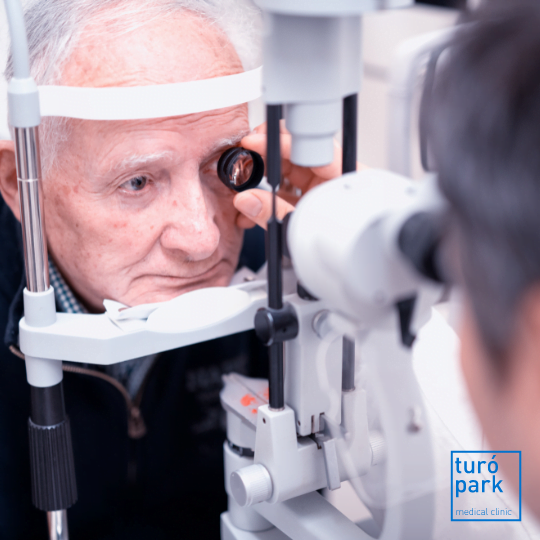Do you suffer from glaucoma and need a specialist ophthalmologist in Barcelona?
Glaucoma is a chronic eye disease that affects 1 to 2% of people over 40. About 10% of people over 70 suffer from it. It is also the second leading cause of blindness in Europe, after age-related macular degeneration (AMD).
If you suffer from glaucoma or would like to be screened, do not hesitate to make an appointment with one of our ophthalmologists.
What is glaucoma?
Glaucoma is a chronic disease caused by an increase in intraocular pressure that gradually destroys the fibres of the optic nerve.
Glaucoma is most often a problem with the emptying of the aqueous humor, one of the fluids in the eye. The internal pressure then increases, suddenly and intensely in the case of acute glaucoma, very gradually if the glaucoma is chronic.
Fast track your treatment
To book an appointment or speak with one of our friendly team, please get in touch using the options below.

Glaucoma: symptoms
Glaucoma remains completely asymptomatic for most of its course.
In the advanced stages, however, glaucoma may be accompanied by the following symptoms:
- Headaches
- Sudden blurred vision
- Red eye
- Eye pain
- Seeing coloured halos around lights
- Extreme sensitivity to light
- A dilated pupil
- Nausea and vomiting.
The different types of glaucoma
There are two types of glaucoma.
Chronic open-angle glaucoma
Primary open-angle glaucoma (POAG) is a form of glaucoma where the trabeculum has lost its permeability. Its management is specific and does not lead to a cure. It is the most common form of glaucoma.
Chronic angle-closure glaucoma
Angle closure glaucoma is a particular form of secondary glaucoma. Much less frequent in France than chronic open-angle glaucoma, it is secondary to a malformation that causes the iridocorneal angle to close. Most often it is a case of an eye that is too short (small as in hyperopia) or of an abnormal insertion of the iris.
What causes glaucoma?
Glaucoma is caused by an increase in pressure in the eye. This increase in pressure is the result of a blockage in the filter that removes intraocular fluid, also known as the aqueous humour. This filter, called the trabeculum, gradually becomes blocked in some people, no longer allowing sufficient passage of the aqueous humour that is constantly produced inside the eye.
Glaucoma can also be the result of the iris coming together in front of the trabeculum (acute glaucoma), or of the existence of an abnormal and impermeable membrane in front of this trabeculum from birth (congenital glaucoma).
It is also important to know that glaucoma generally occurs from the age of 40 onwards and its frequency increases with age. Also, people with dark skin, mainly people of African origin, have a higher risk of developing glaucoma, which often appears earlier.
How can glaucoma be diagnosed?
Glaucoma is often diagnosed late, during a consultation for another eye problem: age-related presbyopia, the onset of cataract, glasses replacement, etc.
Several examinations can be proposed to detect glaucoma.
The fundus examination allows us to observe the retina and the starting point of the optic nerve, looking for signs of damage to the optic fibres.
This examination highlights the impact of the damage to the optic nerve and its progression. Glaucoma is characterised by a progressive and irreversible damage to the visual field, initially peripheral (on the sides and near the nose) and for a long time unnoticed.
See life in colour!
Protect your eyes and avoid eye problems with professional care from Turó Park Clinics.

Glaucoma treatment
If it is not possible to restore lost vision, it is possible to stop the progression of glaucoma and vision loss by reducing intraocular pressure.
Several treatments can be offered to the patient depending on the progress of the disease.
Laser treatment may be necessary as a first line treatment but is most often prescribed when drug treatment no longer works.
Laser trabeculoplasty involves selective photocoagulation of the iridocorneal angle, which results in improved aqueous humor flow through the trabeculum.
Our team of English-speaking ophthalmologists

